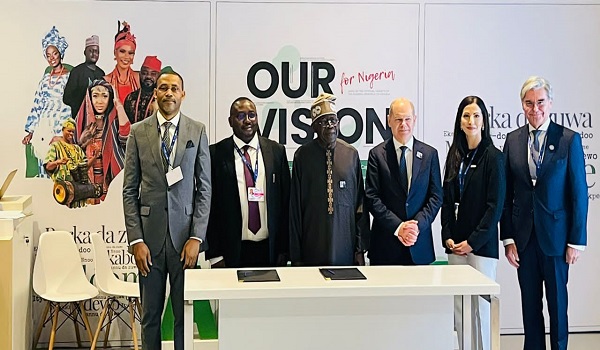President Bola Tinubu of Nigeria and German Chancellor Olaf Scholz presided over the signing of a groundbreaking agreement in Dubai on Friday evening. The pact, focusing on the accelerated performance of the Presidential Power Initiative (PPI), is set to bring about transformative changes in Nigeria’s electricity landscape.
Strengthening Bilateral Ties in Dubai
The signing ceremony took place on the sidelines of the COP28 climate summit, highlighting the commitment of both nations to address not only environmental challenges but also crucial infrastructural needs. The presence of the Nigerian and German leaders in Dubai underscores the international collaboration required to tackle energy-related issues on a global scale. The shared vision for a sustainable and electrified future was palpable as the leaders witnessed the culmination of efforts that began with former Chancellor Merkel’s visit to Abuja in 2018.
Read also: Germany, Nigeria sign $500m renewable energy deal
From Electrification Roadmap to Accelerated Realization
The journey of the PPI, formerly known as the Nigeria Electrification Roadmap Initiative, has been one of evolving commitments and strategic alignments. The signing of an agreement in 2019 laid the foundation for concerted efforts between Nigeria and Germany to bolster the power sector.
President Tinubu’s unwavering advocacy for the swift realization and expansion of the PPI has resulted in three rounds of bilateral discussions with Chancellor Scholz in different global forums, including New Delhi, Abuja, and Berlin.
End-to-End Modernization and Sustainable Growth
The essence of the agreement lies in its ambition to comprehensively modernize and expand Nigeria’s electric power transmission grid. The outlined timeline of 18 to 24 months sets a brisk pace for the delivery and installation of Siemens-manufactured equipment. Mr. Kenny Anuwe, Managing Director of FGN Power Company, emphasized Siemens Energy’s effective contribution, citing the delivery of crucial equipment valued at over 63 million Euros since the project’s inception. This includes mobile substations, transformers, and ongoing installations at various sites across Nigeria.
Furthermore, the agreement underscores a commitment to project sustainability and maintenance. Integral to this vision is the transfer of technology and training for Nigerian engineers at the Transmission Company of Nigeria (TCN). This multifaceted approach not only addresses immediate infrastructural needs but also lays the groundwork for long-term self-sufficiency and expertise in managing the nation’s power grid.
Germany introduces ‘Circulary’ for digital waste processing in Lagos
The ambitious project will not only focus on modernizing existing infrastructure but also cater to identified load demand centers, particularly economical and industrial hubs nationwide. The plan includes the execution of new substations in target load centers with economic priority, along with the development of thousands of kilometers of overhead transmission lines to connect new substations with existing ones.
As the agreement sets in motion a transformative phase for Nigeria’s energy sector, it stands as a testament to the collaborative efforts of both nations in addressing the critical need for reliable and sustainable electricity. The coming months and years are poised to witness tangible improvements in the nation’s power supply, paving the way for economic growth and prosperity.




